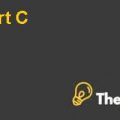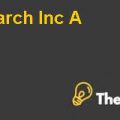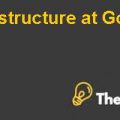McCoy Industries Case Study Solution
Theoretical share price
The theoretical share price of Hudson Incorporation has been calculated by using the earnings per share of Hudson and price earnings ratio of McCoy Corporation. The price earnings ratio of McCoy Incorporation is 20, whereas the earnings per share of Hudson is 2.31, hence resulting in the share price of 46.2.
Recommendation
After taking into consideration the valuation of the company using the discounted cash flow method; the weighted cost of capital of 10.58 percent most likely provides the fair value for the investment from McCoy. It is recommended that Peter should purchase the number of outstanding shares of Hudson for 10.39 per share, rather than purchasing them at the market value of shares.
Acquiring Hudson with low value of stock would most likely bring short term gains to the company because of the assets stripping. The synergy between the acquired and surviving companies would cause more efficient use of resources for the soft financial benefits and substantial cost saving.
In addition to this;the valuation of the company reflects the positive net present value of Hudson, which provides a solid foundation that the value of the firm would be increasing and would eventually lead to the maximized wealth of shareholders. The positive or greater than zero net present value shows that decision of acquiring Hudson would be proven as a compelling strategy for growth.
Apart from the quantitative analysis; the acquisition strategy would provide an opportunity to the company for creating the leverage that includes balancing revenues and cutting costs. It would lead the company towards an improved market presence and seized market share. It would result in improved profit returns over the period of five years, while reducing the stronghold of the market competition. The growth through acquisition strategy would most likely reduce the capacity of the competitors.
McCoy Incorporation has contemplated to adapt the acquisition strategy as a route for gaining competencies and resources. The benefits of acquiring Hudson would range from increasing in the revenues of the company on immediate basis to improving the long term financial outlook in order to make it easier for the company to raise funds for other growth strategies.
Conclusion
McCoy Industries has significantly evolved as a fabricator of the components used in the production of heavy tools and equipment.The company has been engaged in designing, selling and sustaining the products through their life cycle. The company takes a major part in capita market consulting for strategic investment, acquisition & merger and business valuation.McCoy uses acquisition strategy as a part of its corporate strategy with the core purpose of becoming the market leader and to pursue the growth opportunities in order to increase its stock or resources, reach lucrative markets, generate more profit, influence the market price and reduce the external risks.
McCoy has found Hudson much attractive because of its long term competitive position in the market, which resulted from aligning the core competencies to the market opportunities. The acquisition of Hudson would most probably expand the product offerings of the company and generate the economies of scale, and would strengthen its competitive position against other tool manufacturer companies including foreign and domestic.
The weighted cost of capital of 10.58 percent most likely provides the fair value for the investment from McCoy. It is recommended that Peter should purchase the number of outstanding shares of Hudson at 10.39 per share rather than the market value of shares. The acquisition strategy would provide an opportunity to the company to create the leverage, which includes balancing revenues and cutting costs. It would lead the company towards an improved market presence and seized market share
Appendix A – List of Assumptions
| List of assumptions | |
| Annual Growth Rate of Total Revenue | 5.00% |
| Cost of Sales/Revenue | 0.69 |
| G&A/Revenue | 22.24% |
| Operating Income (EBIT)/Revenue | 3.65% |
| Tax Rate | 1.21% |
| Depreciation/Revenue | 3.80% |
| Interest/Revenue | 1.45% |
| Other cost/Revenue | 0.33% |
| Ch. Net Working Capital/Revenue | 1.30% |
| Capex/Revenue | 2.00% |
Appendix B – Weighted Average Cost of Capital
| WACC Calculation | ||
| Debt | 120.00 | 0.2790698 |
| Equity | 310.00 | 0.7209302 |
| Cost of equity | 13.00% | |
| Cost of debt after tax | 4.33% | |
| Interest expense | 8.00 | |
| WACC | 10.58% | |
Appendix C – Discounted Cash Flow Model
| DCF Valuation | Hudson Incorporation | ||||||
| Assumptions | Base year | Forecasted years | |||||
| Operations | 2014 | 2015 | 2016 | 2017 | 2018 | 2019 | |
| Net sales | 0.05 | 553.00 | 580.65 | 609.68 | 640.17 | 672.17 | 705.78 |
| COGS | 0.69 | 379.00 | 397.95 | 417.85 | 438.74 | 460.68 | 483.71 |
| Gross profit | 174.00 | 182.70 | 191.84 | 201.43 | 211.50 | 222.07 | |
| Selling, general and administrative expense | 0.22 | 123.00 | 129.15 | 135.61 | 142.39 | 149.51 | 156.98 |
| Depreciation expense | 0.04 | 21.00 | 22.05 | 23.15 | 24.31 | 25.53 | 26.80 |
| Interest expense | 0.01 | 8.00 | 8.40 | 8.82 | 9.26 | 9.72 | 10.21 |
| Other deductions | 0.00 | 1.80 | 1.89 | 1.98 | 2.08 | 2.19 | 2.30 |
| Income before taxes | 0.04 | 20.20 | 21.21 | 22.27 | 23.38 | 24.55 | 25.78 |
| Taxes | 0.01 | 6.70 | 7.04 | 7.39 | 7.76 | 8.14 | 8.55 |
| Net income | 14.18 | 14.88 | 15.63 | 16.41 | 17.23 | ||
| Changes in working capital | 0.01 | 7.55 | 7.93 | 8.32 | 8.74 | 9.18 | |
| Capital expenditure | 0.02 | 11.61 | 12.19 | 12.80 | 13.44 | 14.12 | |
| Depreciation | 0.04 | 22.05 | 23.15 | 24.31 | 25.53 | 26.80 | |
| Free Cash Flows | 17.06 | 17.92 | 18.81 | 19.75 | 20.74 | ||
| Terminal Value | 390.19 | ||||||
| Discount Period | 0.00 | 1.00 | 2.00 | 3.00 | 4.00 | 5.00 | |
| Discount Factor | 1.00 | 0.90 | 0.82 | 0.74 | 0.67 | 0.60 | |
| Discounted Free Cash Flows | 0.00 | 15.43 | 14.65 | 13.91 | 13.21 | 12.54 | |
| Discounted Terminal Value | 235.97 | ||||||
| Net Present Value / Enterprise value | 305.72 | ||||||
| Growth rate | 0.05 | ||||||
| Hudson shares | 5.84 | ||||||
| NPV | 60.70 | ||||||
| Value per share | 10.39 | ||||||
This is just a sample partical work. Please place the order on the website to get your own originally done case solution.
How We Work?
Just email us your case materials and instructions to order@thecasesolutions.com and confirm your order by making the payment here











